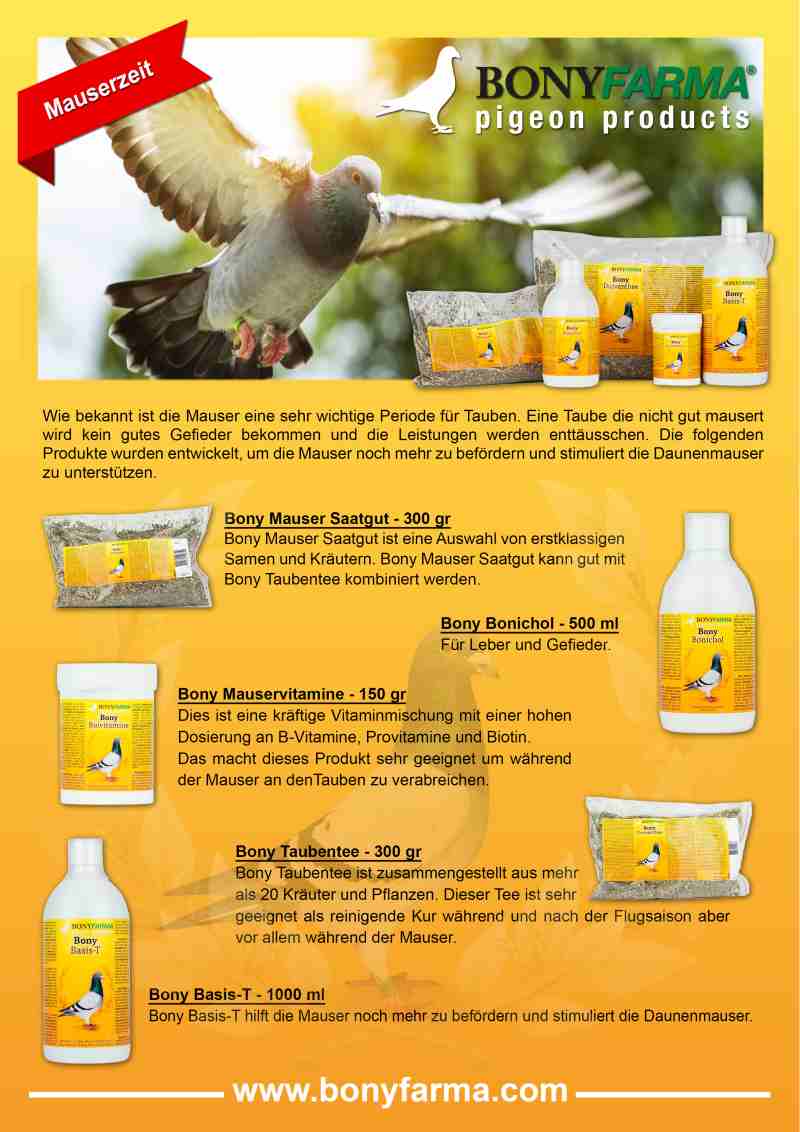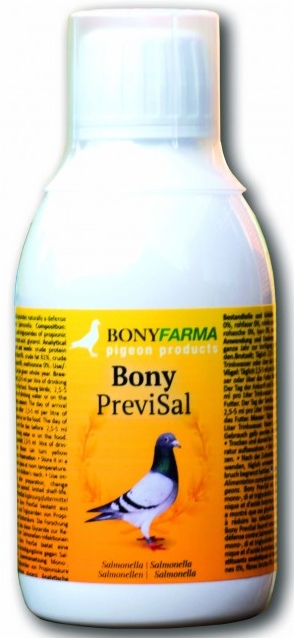In OCTOBER 2022 – by Dr. Peter Boskamp…

Did you know that…..?
The moulting period is primarily the time to take good care of the pigeons. Most breeders know that next year's prices are partly made during the previous year's moult. But there are still enough fanciers who don't take it that seriously during the moult and more or less leave the pigeons to themselves to concentrate on other things. But it is particularly important to give the pigeons good support during the moult.
Detoxify.
Detoxifying the body is important. In addition to providing sufficient amino acids, including certainly sufficient methionine, lysine and choline. Proper functioning of the enzyme glutathione is also important. It can be argued that this enzyme is the liver's main detoxifier. The substance that plays an important role in the production of glutathione is NAC, or N-acetyl-cysteine. This substance helps the liver work better. This is important during moulting, but also for the removal of pollutants from the human and animal bodies. Just think of harmful substances in medicines and vaccines.
Medication.
Medication during moulting should be kept to a minimum if possible and restricted only to pigeons unable to change plumage due to illness. In all other cases it is a 'no go'. There are various substances that can negatively affect the quality of the feathers. It has traditionally been known that certain anthelmintics can cause deformed feathers. But we should not only think of visible deformities in this context. Even invisible quality damage can have far-reaching consequences.
In this regard, it should be noted that sulfa preparations (also often used as a remedy for paratyphoid fever in combination with trimetoprim) can damage the shafts of the feathers, which reduces the quality of the feathers and makes them easier to break (during the racing season?). This in turn can mean that the pigeons can not provide the services that they could otherwise achieve.
For the same reasons, to ensure the quality of the springs, it is important to optimize the support of the structure of the new springs.
There are many roads that lead to Rome when it comes to caring for pigeons during moulting. The starting point should be that sufficient sulfur-containing amino acids are provided. But not only that. During the moult, the liver works with high tension. In order for the new springs to be optimal, so much new building material must be produced. In addition, a lot of waste is produced. These waste products must therefore be removed from the liver and kidneys. Optimizing these organs for moulting is therefore not an unnecessary luxury.
Paratyphoid is a devastating disease that can lead to death, infertility, loss of fitness, inability to fly, etc. A disease you don't want in your loft.
Vets tend to all talk the same thing. Dissent is often fought with fire and sword. For example, it remains a persistent habit to treat pigeons against this disease in the fall. So-called preventive cures. Breeders have often been doing this for many decades and find it difficult to get rid of it.
crazy phenomenon.
Now, a crazy phenomenon has been occurring in recent years. At least that's what I find from my research. In bacteriological research we often see that paratyphoid bacilli are multi-resistant to common antibiotics. All in all, the use of these means of prevention is like putting the cart before the horse. Quite simply, because treatment with these agents not only tries to kill the actually less or less sensitive paratyphoid bacillus, but also the good intestinal bacteria that ensure the balance in the intestine.
By giving the (wrong) medication now, the paratyphoid problem is actually getting bigger. There are many examples of breeders who come to our practice a month or two after a 'preventive cure' because they have paratyphoid 'again'. Many are unaware that it is their own fault.
In the past, there were good remedies against this disease, which usually had little resistance. The names of these drugs still exist, but the composition has changed completely, since the products that worked well are no longer allowed. This of course also contributes to the above phenomenon. This is unavoidable.
PreSal.
I myself have been away from these preventative cures for a long time. Especially with my own pigeons. Bony PreviSal has a supporting effect on the good intestinal bacteria and E. Coli and Salmonella seek a good refuge. The bottom line is that these bacteria find it difficult to survive in the intestinal climate created by Bony PreviSal. In October itself I give this product to my pigeons for a month.
vaccinations.
Finally, something about vaccinations. I personally have found Zoosal T to be a very good vaccine against paratyphoid in pigeons for many years. Unfortunately it was withdrawn from the market. I heard from the IDT company that marketed the vaccine that a vaccine they are marketing for pigs contains the exact same strain that they had in the pigeon vaccine. (In addition, there are some other strains that are useless for pigeons because they are not sensitive to them. The rest is in principle mainly ballast for the pigeons. According to the information, the pigeons do not react immunologically).
This vaccine is 100 times stronger than the original vaccine. It must therefore be emphasized that if one wants to use this vaccine, it must be diluted. Then you basically have the same effective dose as is available in Zoosal T. In principle, 2000 pigeons can be vaccinated with one bottle.
The Off label use is allowed as long as no other effective vaccines registered for pigeons are available. This is the so-called cascade scheme in Europe. However, registered paratyphoid vaccines for pigeons are not available in several European countries.
In the case of a clinical outbreak of paratyphoid or in lofts with a history of paratyphoid, vaccinating pigeons against this disease can also help to get the problem under control.
Good luck!

Advertising:





